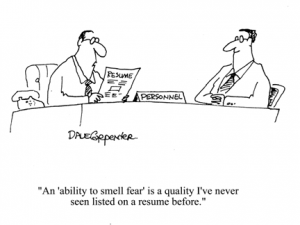 Keep in mind that most people in the hiring process, especially in Human Resources, review somewhere close to a googol of resumes in their career. Hyperbole perhaps, but hopefully you understand the extent of the sheer numbers you are up against when you apply for any position. Needless to say, if your resume does not pass the first review, you are highly unlikely to get that position.
Keep in mind that most people in the hiring process, especially in Human Resources, review somewhere close to a googol of resumes in their career. Hyperbole perhaps, but hopefully you understand the extent of the sheer numbers you are up against when you apply for any position. Needless to say, if your resume does not pass the first review, you are highly unlikely to get that position.
Most HR staff, myself included, look at resumes and quickly put the bits of information contained therein into one of three categories:
- Things that qualify you for the position
- Things that tend to neither help nor detract from your candidacy
- Things that disqualify you for the position or otherwise raise a red flag
Time and time again, the same types of mistakes occur. Since categorization seems to be a sub-theme of this blog, here is my list of the types of mistakes to avoid and the good, the bad and the ugly. Caveat — I’ve participated in many resume critique workshops at colleges helping students perfect a resume — one thing that I have noticed is that each college’s idea of a perfect resume differs. For example, one college insists that you have an “Objective” statement and one college insists that you DO NOT have an ‘Objective” statement. This segues into #1: